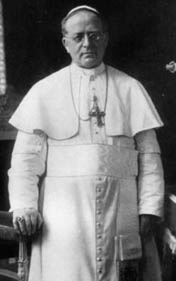ENCYCLICAL OF POPE PIUS XI ON RECONSTRUCTION OF THE SOCIAL ORDER

Description: Pope Pius XI
Image copyright: Google
A Summary Article by Gerald Darring
Pius XI made several positive judgments about the society of his day. He saw that the poverty which Leo XIII beheld in all its horror was less widespread, and the condition of workers had been improved (a. 59). The ranks of the workers were showing signs of a social reconstruction (a. 140): workers' associations of all types had been formed (a. 31-36) and associations of farmers and other middle-class people were flourishing (a. 37). Many leaders of workers' organizations were striving to satisfy workers' demands and to harmonize those demands with the prosperity of everyone involved in their occupation (a. 140). Meanwhile, rulers of nations were promoting a better social policy than before (a. 26), and laws had been passed protecting life, health, strength, family, home, workshops, wages, etc. (a. 28)
The pope's negative judgments about contemporary society were more numerous. Associations of employers were uncommon (38), and the number of the non-owning working poor had increased enormously (a. 59).
Capital had been able to appropriate too much to itself, so that economic institutions had moved in the direction of giving all accumulation of wealth to the rich (a. 54). The result was a huge disparity between the few rich and the many poor (a. 58, 60). Free competition had destroyed itself; economic dictatorship had supplanted the free market (a. 109). A despotic economic dictatorship was consolidated in the hands of a few (a. 105), and the characteristic mark of contemporary economic life was a concentration of power and might (a. 107). This concentration of power generated conflict on the economic, political, and international planes (a. 108) with the result that society was in a violent condition and was unstable and uncertain because it was divided into opposing classes (a. 82).
One section of socialism had degenerated into communism, which sought unrelenting class warfare and absolute extermination of private ownership (a. 112). All existing forms of communism and socialism were incompatible with the Gospel (a. 128). Capitalism, on the other hand, was not to be condemned in itself; it was not of its own nature vicious (a. 101). And yet, capitalism was laboring under the gravest of evils (a. 128). Some people had come to believe that they could use any means to increase their profits and protect their wealth against sudden changes of fortune. In uncontrolled business dealings, they raised or lowered prices so as to make quick profits with the least expenditure of work (a. 132). Corporations gave individuals the opportunity to perpetuate injustice and fraud under the shelter of a joint name (a. 132), and governments had been delivered to the passions and greed of individuals (a. 109). An economic imperialism had developed on the international level (a. 109).
The rich social life that was once highly developed through associations of various kinds had collapsed into a situation in which there remained virtually only individuals and the government (a. 78). The social order that once existed, an order that met to some extent the requirements of right reason, had perished because people had become too selfish and disrespectful of authority (a. 97).
Many people involved in economic life had fallen away from the Christian spirit (a. 127). The social and economic system had become an obstacle to people's eternal salvation (a. 130), and people were confronted with a world that had almost fallen back into paganism (a. 141).
A body of economic teaching had arisen which gives completely free rein to human passions (a. 133). Families were being torn apart by poor housing conditions (a. 135). People and raw materials entered factories, which ennobled the raw materials and degraded the people (a. 135). The sordid love of wealth was the shame and great sin of the age (a. 136).
These negative judgments about society led Pius XI to see the need for a reconstruction of society. He decided that two things were especially necessary: a reform of institutions, and the correction of morals (a. 77). On the one hand, economic life must again be subjected to and governed by a true and effective directing principle (a. 88), and it must be led back to sound and right order (a. 136). The members of the body social should be reconstituted and the directing principle of economic-social life should be restored (a. 90). Economic activity should return to right and sound order (a. 110). On the other hand, there needs to be a reform of morality (a. 97). There must be a renewal of the Christian spirit (a. 127), and we long for a full restoration of human society in Christ (a. 138)
Pius XI laid down a number of guidelines for solving contemporary problems.
Quadragesimo Anno is an encyclical by Pope Pius XI, issued 15 May 1931, 40 years after Rerum Novarum (thus the name, Latin for 'in the fortieth year'). Written as a response to the Great Depression, it calls for the establishment of a social order based on the principle of subsidiarity.
Bibliography
http://www.bookrags.com/wiki/Quadragesimo_Anno
http://xroads.virginia.edu/~MA01/kidd/thesis/pdf/quadragesimo.pdf
